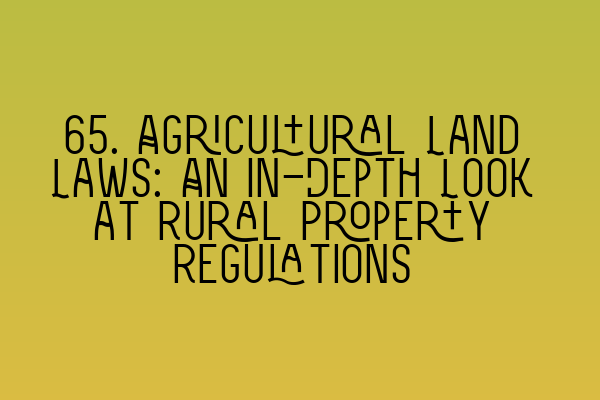65. Agricultural Land Laws: An In-Depth Look at Rural Property Regulations
Welcome to SQE Property Law & Land Law! As experienced solicitors specializing in property law, we understand the intricacies and importance of agricultural land laws. In this blog post, we will provide you with an in-depth look at rural property regulations, shedding light on key aspects that every landowner, investor, and aspiring lawyer should be familiar with. So, whether you are preparing for the SQE 1 exam, seeking professional guidance, or simply interested in learning more, this article is for you.
Agricultural land laws play a significant role in the administration and protection of rural properties. They encompass various rules and regulations designed to manage land use, agricultural activities, conservation, and more. Understanding these laws is crucial for landowners, tenants, and industry professionals alike to ensure compliance, maintain legal rights, and make informed decisions concerning agricultural properties.
One of the primary concerns in agricultural land laws is the unique nature of rural properties and their specific requirements. Unlike urban land, agricultural land often serves multiple purposes, such as crop cultivation, livestock rearing, or even rural tourism. As a result, a complex and multi-faceted regulatory framework has been developed to address the various needs and challenges associated with agricultural land use.
Let’s delve into some key aspects of agricultural land laws that you should be aware of:
1. Tenancy Agreements:
Agricultural land leases are governed by specific legislation, such as the Agricultural Holdings Act 1986 or the Agricultural Tenancies Act 1995. These acts define the rights and responsibilities of both landlords and tenants, including rent obligations, duration of the lease, and conditions for termination.
2. Planning Permission:
Before embarking on any agricultural development or change in land use, obtaining planning permission is essential. Local planning authorities assess applications based on guidelines outlined in the National Planning Policy Framework (NPPF) and other relevant legislation. This helps to ensure that developments align with sustainable land management and environmental considerations.
3. Environmental Stewardship:
Preserving and enhancing the natural environment is a significant aspect of agricultural land laws. Environmental Stewardship schemes, offered by organizations such as Natural England, provide grants and incentives to farmers and landowners who engage in sustainable land management practices, biodiversity conservation, and the protection of landscapes.
4. Cross-Compliance Rules:
To receive certain agricultural subsidies and payments, landowners and tenants must comply with cross-compliance rules. These rules encompass various statutory requirements, including animal welfare, environmental protection, and public health standards. Failure to meet these obligations may result in penalties or the loss of financial support.
5. Agricultural Holdings:
The Agricultural Holdings Act 1986 governs the relationship between landlords and tenants on agricultural holdings. It addresses matters such as rent reviews, succession rights, improvements, and compensation. Familiarizing yourself with this legislation is crucial for advising clients and ensuring fair and equitable agreements.
For those preparing for the SQE 1 exam, understanding agricultural land laws is vital for success. The exam may include questions related to rural property regulations, tenancy agreements, planning permission, and other associated topics. To fully prepare, we recommend practicing with our SQE 1 Practice Exam Questions and SQE 1 Practice Mocks FLK1 FLK2. These resources provide hands-on experience and valuable insights into the exam format.
At SQE Property Law & Land Law, we offer comprehensive preparation courses for both the SQE 1 and SQE 2 exams. Our expert tutors have extensive experience in property law and provide tailored guidance and support to help you succeed. To learn more about our SQE 1 and SQE 2 Preparation Courses, click here.
If you’re interested in staying updated with the latest SRA SQE Exam Dates, be sure to check out our article on the subject. Keeping track of exam dates and deadlines is essential for effective exam preparation and planning.
Understanding and navigating agricultural land laws can be a complex endeavor, but with the right knowledge and guidance, you can confidently address the legal challenges surrounding rural properties. Whether you are a landowner, tenant, or aspiring legal professional, awareness of these regulations is crucial to safeguard your interests and make informed decisions. If you need assistance or further information, please don’t hesitate to contact us at SQE Property Law & Land Law.
(Author: [Your Name])
